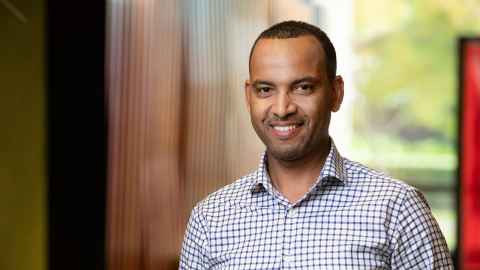AI set to check older Kiwis’ meds
24 May 2024
Newly funded research will develop an AI tool to check older New Zealanders are on the right medicines.

A newly funded study will seek to develop New Zealand’s first digital tool using AI technology to guide the safer use of medicines in older adults and reduce the amount of harmful or unnecessary medicines prescribed.
Clinical pharmacy senior lecturer Dr Mohammed Mohammed from the University of Auckland has received an Emerging Researcher First Grant from the Health Research Council of New Zealand (HRC) of $400,000 to develop this new digital tool.
It will use AI to help clinicians screen older New Zealanders at risk of inappropriate prescribing.
“Like many other developed countries, we have a growing ageing population in Aotearoa New Zealand. In just four years from now, about one million people will be over the age of 65, with one in three taking five or more concurrent medicines, known as polypharmacy,’’ says Dr Mohammed.
‘‘While medicines are very helpful for the prevention and treatment of health problems, inappropriate use can lead to a range of problems such as falls, injuries, and hospitalisation in older adults,” he says.
There are two major problems: prescribing a medicine that is not quite right for an elderly person, which affects about one in two older people, and/or omission of a medicine that is necessary, which affects about one in three older people.
Dr Mohammed says clinical decision-support tools can help healthcare providers to check patients are on the right medications by consolidating patient information from multiple data sources into one system.
Existing tools do not account for the complexity of medicine-related problems that older adults may experience.
In addition, those developed overseas are not directly applicable to New Zealand, as they don’t use New Zealand guidelines or pharmaceutical data.
With the help of this HRC funding, Dr Mohammed and his team will develop a digital tool that will identify individuals at risk of harm and provide personalised recommendations at the point of care.
This could be alerting a doctor to start a new medicine or to stop a medicine that is causing harm or is not helping a patient.
“Ensuring that the tool is user-friendly is crucial, so we will seek feedback from healthcare providers and patients.
“We will also embed key resources into the tool so that healthcare providers can give patients customised information, such as possible adverse withdrawal symptoms and instructions for self-care,” says Dr Mohammed.
HRC Chief Executive Professor Sunny Collings says this research has the potential to transform the management of medicines for older adults in New Zealand.
“Using innovative technology to support healthcare providers – particularly general practices and hospitals – to offer personalised, safer prescription services to our growing elderly population, and reduce medication errors and their associated healthcare costs could greatly benefit our health system,” says Professor Collings.
Dr Mohammed is one of more than 20 up-and-coming researchers to receive Emerging Researcher First Grants from the HRC in 2024 to a combined value of $9.4 million. Read about the other University of Auckland recipients.
Media contact
FMHS media adviser Jodi Yeats
M: 027 202 6372
E: jodi.yeats@auckland.ac.nz